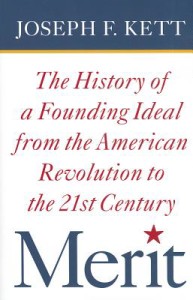Merit: The History of a Founding Ideal from the American Revolution to the Twenty-First Century. By Joseph F. Kett. Ithaca, NY: Cornell University Press, 2013. 332 pages. $29.95. Hardcover.
Review by Bradley Baranowski
As the title of his work indicates, Joseph F. Kett provides a sweeping history of the concept of “merit.” Starting with the American Revolution, Kett traces the various permutations and developments in the idea up to today. Two conceptions of merit bookend his study: essential merit and institutional merit. The former, writes Kett, has rested on “an individual’s visible and notable achievements and/or performances, [and] is most than the sum of achievements/performance.” In this mode, achievements “are seen as an accurate reflection of one’s inner merit” (2) and promotions in status are a just reward for good character.
This first type of merit was essential to the success of American politics during the Revolutionary era. Individuals such as George Washington, Thomas Jefferson, and other founders distinguished themselves during the war through their service and ability. In return, they gained the status required to run the nascent country during the first decades of peace.The period witnessed the transformation of merit, Kett argues, from “a self-imagined attribute of the colonial gentry that was tightly bound to their conception of their reputation and honor, into a political concept, an ideal on which public policy was to be based.” (37) Thus norms once limited to a quasi-aristocracy strata of society were recast as normative guidelines for an entire democracy.
Generative as essential merit might have been during this period, the age also revealed some of the series problems with the concept. Individuals who went unrecognized by their peers felt spurred. Not only did these people complain. They could, such as in the case of Benedict Arnold, betray the very society they had served if their merit went unrecognized. Even if treason did not enter into the picture, basing the social hierarchy on individual assertion—and informal validation—of ability was a recipe for political instability.
Indeed, the hyper individualism of the early nineteenth century was, for Kett, a product of this dynamic of essential merit. Once independence was secured, the avenues for demonstrating merit narrowed considerably. Without the option of serving a war or building a nation being open, amassing wealth became one of the key signs of merit. As Freeman Hunt, an early nineteenth-century editor and writer, concluded, “there remains but one basis of social distinction, namely wealth” (95). Unfortunately, this quest for wealth left many impoverished. Businessmen took on unsustainable amounts of debt with the hope of growing their businesses only to have roughly one-third of these enterprises end in bankruptcy. (96) While essential merit may have driven individuals to perform great acts in service of building the republic, it also threatened to tear the fledgling United States apart.
Enter institutional merit—the tamer of such excesses. The standards of judgement differed greatly between institutional and essential merit. Contrasting with the latter’s focus on the individual, institutional merit was socially-minded in its assessments. “A persistent component of institutional merit,” writes Kett, “has been its orientation toward identifying promise in the form of aptitudes and abilities likely to lead to superior performance at some future date” (7). This socially-minded quality manifested itself in how institutional merit rewarded talent. “Essential merit demanded rank as its reward,” notes Kett, whereas institutional merit “subordinated rank to categories of achievements,” each being recompensed by honors and pay raises rather than outright promotions in status (6-7). Rather than continuously prompt individuals to reach a higher rank among their peers, and upend the social order in turn, institutional merit cultivated a different notion of reward: namely, one that could be written on a check or handed out on a report card. Institutional merit dolled out quantitative
awards whereas essential merit had promised qualitative ones.
As the name suggests, institutional merit has been upheld by institutions. The tests and standards that groups have used to gauge this merit have been many. Intelligence tests in the army during the First World War, Kett notes were linked to exams in places like Charles Elliot’s Harvard in their efforts to identify individual skill sets. Indeed, institutional merit characterized broader shifts in social thought that occurred during the nineteenth century. Reformers of various stripes came to see, Kett writes, “society as less malleable by exertion of the individual’s will; more complex social structures had created a denser atmosphere” (126). While there are numerous examples of tests and reforms that attempted to gauge talent within this context, they all point to Kett’s singular achievement: to connect changes in university pedagogy to civil service reform, and then draw lines all the way back to George Washington and the Founding generation. Measuring merit—be it essential or institutional—is as American a practice as they come.
Deeply ingrained as it is, merit’s worth has not gone uncontested. Emphases on equality in U.S. political thought have long caused intellectual problems for advocates of merit. In the early days of the republic, for instance, establishing expert control over professional standards in fields like law and medicine was nearly impossible. “Ultimately,” Kett writes, “the Revolution’s legacy of equal rights worked against ceding control of professional entry  to bar and medical associations.” Followers of herbalists, for example, “successfully argued that medical practice should be open to anyone” by critiquing “doctors for their Latinate mumbo-jumbo” that made understanding health issues impossible for the layman (52). Despite these issues, Kett believes that merit has remained central to how Americans judge each other’s worth right up to recent decades. “More often than not,” he writes, “Americans have reconciled merit with other principles of the Founding” (263).
to bar and medical associations.” Followers of herbalists, for example, “successfully argued that medical practice should be open to anyone” by critiquing “doctors for their Latinate mumbo-jumbo” that made understanding health issues impossible for the layman (52). Despite these issues, Kett believes that merit has remained central to how Americans judge each other’s worth right up to recent decades. “More often than not,” he writes, “Americans have reconciled merit with other principles of the Founding” (263).
It is in this reconciliation process, however, that the thread finally starts to fray. Today, merit appears from Kett’s perspective to be losing its grip on America’s moral imagination. Critics from moral philosophers to the New Left have pointed out philosophic deficiencies in the idea. John Rawls, for instance, in an oft-remarked upon part of A Theory of Justice (1971) argued that deciding a society’s distributive by the standard of desert[1] was morally indefensible. “No one deserves his greater natural capacity nor merits a more favorable starting place in society,” wrote the philosopher.[2]
Instead of basing the distribution of goods on such an arbitrary standard, he suggested that society allocate resources in such a way as to make those at the bottom rung of the social hierarchy as well of as possible. For Rawls, equality trumped merit.
If philosophers were the only Americans critiquing the concept, merit might stand a chance. But Kett believes that the issue is more systematic than this. Notably, he writes, “achievement” in American culture has become synonymous with popularity. “Time named ‘You’ its 2006 ‘person of the year,’” complains Kett, “and Lady Gaga ends her performances by crooning, ‘Don’t go away loving me, go away loving yourself.’” Thus, he surmises, “The land of instant celebrity is also the land of self-esteem.” The result of this is that every “year the line between achievement and media-hyped publicity becomes fuzzier.” (261)
These examples are suspect. Isn’t it equally plausible that America’s culture of celebrity is also an outgrowth of our historical obsession with demonstrating self worth and merit? After all, it was merit that fueled the early republic’s hyper-individualism, not equality. Might America’s obsession with fame be a sign of a return to an older form of merit rather than its obsolescence? While Kett is willing to note limits on merit as an ideal, he appears unwilling to consider a deeper issue: that left unchecked, it can lead to apparently unmeritocratic ends.
Such ambiguities should not, however, distract from the book’s worth. If anything, they are added value. As Kett’s musing on contemporary America allude, Merit is both a history of morality and a moral history. The latent tale of this book is less about understanding merit’s history than it is about using history to understand the value’s worth and limitations. Begrudging as Americans are to take yet another test, fill out yet another form, and report to yet another committee, institutional merit appears a far cry better value than its predecessor. Kett establishes this point not through logical argumentation like a philosopher but rather through the historian’s best guide to moral philosophy: the narrative form. For these reasons alone, his book merits serious attention.
[1] While Kett notes the differences that various thinkers have drawn between “desert” and “merit,” Rawls’s critique did not make such a sharp distinction. For Kett’s account of the difference, see Kett, 96-99.
[2] John Rawls, A Theory of Justice (Cambridge, MA: Belknap Press of Harvard University, 1971), 102.
Bradley Baranowski is a doctoral student at the University of Wisconsin-Madison studying twentieth century U.S. intellectual history. His dissertation examines the career of John Rawls’s 1971 A Theory of Justice. The project reconstructs Rawls’s early intellectual biography, his shifting relation to the work, and its reception among scholars, politicians, and public. You can find some of his previous writing for this blog here.


One Thought on this Post
S-USIH Comment Policy
We ask that those who participate in the discussions generated in the Comments section do so with the same decorum as they would in any other academic setting or context. Since the USIH bloggers write under our real names, we would prefer that our commenters also identify themselves by their real name. As our primary goal is to stimulate and engage in fruitful and productive discussion, ad hominem attacks (personal or professional), unnecessary insults, and/or mean-spiritedness have no place in the USIH Blog’s Comments section. Therefore, we reserve the right to remove any comments that contain any of the above and/or are not intended to further the discussion of the topic of the post. We welcome suggestions for corrections to any of our posts. As the official blog of the Society of US Intellectual History, we hope to foster a diverse community of scholars and readers who engage with one another in discussions of US intellectual history, broadly understood.
Thanks for sharing this, Brad.
“…institutional merit appears a far cry better value than its predecessor.”
What’s your basis for this evaluation, and how did you reach it? My sense is that you favor the latter because it’s more socially oriented than the former, but you also address the differences in reward systems. I know that a short blog post doesn’t give you the space to say everything, but I’m curious about your criteria in this particular question.